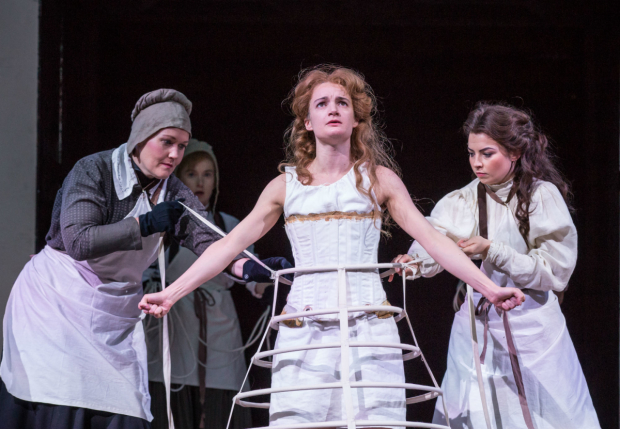The Taming of the Shrew (Shakespeare's Globe)
Caroline Byrne’s all-Irish production of ”The Taming of the Shrew” is a triumph

© Marc Brenner
It’s a bold statement of intent from Emma Rice, the Globe’s new artistic director, to programme one of Shakespeare‘s most intractable comedies as the second production of her new, irreverent, gender-balanced regime. Most women find The Taming of the Shrew almost impossible to watch, as its bold, brave heroine is crushed beneath the foot of a man, in the name of love, and obedience in matrimony.
But Caroline Byrne‘s all-Irish production is quite the best Shrew I have ever seen, and one which intelligently embraces the contradictions of the play, turning it into a thrilling hybrid of comedy and tragedy.
It updates the action to the Ireland of 1916 when, at the time of the Easter Rising, women issued a Proclamation of Independence, declaring their equality with men. This updating, lightly worn, is a revelation: it enables Christopher Sly’s prologue to be replaced by a ballad (written by Morna Regan, who has also reshaped and skilfully cut the text) asserting women’s right to be "numbered in the song".
The Irishness fundamentally alters the tone, too – giving the comedy a lilt and a pleasure (beautifully underscored by the playing of an Irish band) that makes Bianca’s tedious suitors both genuinely funny, but also recognisable types. I loved the rhythmic brogue Raymond Keane lends Grumio and Colm Gormley’s prissy Hortensio. Great energy is provided by the servants – all in a clever twist played by women. Imogen Doel‘s Tranio positively quivers with delight as she dons her master’s jacket and assumes his role; the interaction with the audience is a joy.
But any production of The Taming of the Shrew stands or falls on the relationship between Katherine and Petruchio and this one finds an astonishing balance between high humour and bleak despair. We first meet Aoife Duffin‘s Katherine reading a newspaper and scratching her nether regions, refusing to conform; her look of astonishment at her sister Bianca’s willingness to play by the rules speaks volumes. In a world where men can settle a marriage in moments, Katherine’s rebellious soul, her demand for attention, is a provocation and a challenge.
Duffin, who has learnt and rehearsed the role in just two weeks due to an injury to the actress originally cast, is a glory: angry, tormented, bitterly humorous. In a startling image, when she has been pledged to Edward MacLiam’s quarrelsome chancer Petruchio against her will, we see her suspended on elastic ropes, like a calf before stunning, or a fly caught in a web, the bondage of marriage made explicit. In another, she stands singing defiantly as a brackish puddle darkens the hem of her wedding dress: her desperation is palpable. And though MacLiam exudes a kind of rough charm, there is no doubting the cruelty of his treatment of his bride. She is starved and neglected, bent to his will like an animal – a hawk taught to heed her keeper’s call.
MacLiam retains some sympathy with the sorrow of his delivery; he seems to act against his will. But the most audacious reading is in Kate’s final speech of submission, delivered by Duffin not as an act of simpering, wifely piety, but as a ferocious statement of fact. Her weakness as a woman means she must submit to Petruchio’s bullying; his shamed, silent acceptance of her proffered hand is an acknowledgement of a possible partnership.
The production opens with the cast putting on the shoes that lie on the stage; it closes with a whirring dance to a song that asks for empathy and understanding – a desire to walk in another’s shoes. It is a thorough-going and entirely satisfactory re-reading of a difficult work. A triumph.
The Taming of the Shrew runs at Shakespeare's Globe until 6 August.












